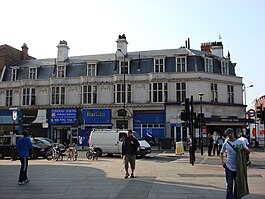Finchley Road tube station
| Finchley Road | |
|---|---|
 | |
| Location | Finchley Road |
| Local authority | London Borough of Camden |
| Managed by | London Underground |
| Number of platforms | 4 |
| Fare zone | 2 |
| OSI | Finchley Road & Frognal |
| London Underground annual entry and exit | |
| 2018 | |
| 2019 | |
| 2020 | |
| 2021 | |
| 2022 | |
| Key dates | |
| 30 June 1879 | Opened (MR) |
| 20 November 1939 | Start (Bakerloo line) |
| 1 August 1941 | Goods yard closed[7] |
| 1 May 1979 | End (Bakerloo line) |
| 1 May 1979 | Start (Jubilee line) |
| Other information | |
| External links | |
| Coordinates | 51°32′50″N 0°10′49″W / 51.5472°N 0.18027°W |
Finchley Road is a London Underground station at the corner of Finchley Road and Canfield Gardens in the London Borough of Camden, north London. It is on the Jubilee line, between West Hampstead and Swiss Cottage and on the Metropolitan line between Baker Street and Wembley Park. It is in Travelcard Zone 2.
The station is 100 yards south of the O2 Shopping Centre. It serves the Frognal and South Hampstead areas. It is also a five-minute walk from the Finchley Road & Frognal station on the London Overground's North London Line, and this is marked as an official out-of-system interchange. The station is in a cutting covered by a single glass and metal canopy and is the northernmost station below street level on the line.
History

The station was opened on 30 June 1879 by the Metropolitan Railway (MR, now the Metropolitan line) on its extension from its now closed station at Swiss Cottage (a different station from the current Swiss Cottage Jubilee line station). The station was rebuilt in 1914 with entrances incorporated into a new parade of shops.
By the mid-1930s the Metropolitan line was suffering from congestion on its main routes from north-west London, caused by the limited capacity of its tracks between Finchley Road and Baker Street stations. To alleviate this congestion new sections of deep tube tunnels were bored between Finchley Road and Baker Street to carry some of the traffic from the Stanmore branch and stations south of Wembley Park. These new tunnels opened on 20 November 1939 and from that date Finchley Road station was also served by Bakerloo line trains running from Baker Street using the new tunnels. The Bakerloo line services were subsequently transferred to the Jubilee line when that line commenced operation on 1 May 1979.
Analysis of earth removed when tunnelling towards the station revealed that its site was the southern limit of a glacier which covered Britain in one of the Ice Ages, as illustrated in episode 3 (Ice Age) of the BBC series British Isles: A Natural History[8]
Services


Finchley Road is served by London Underground Jubilee and Metropolitan line services. The Jubilee line, which is a stopping (or local) service, operates a service frequency of 16 tph (trains per hour) between Stanmore and Stratford. The Metropolitan line offers "stopping services" (with some peak hour "fast" and "semi-fast" services) (no Metropolitan line services stop at stations between Finchley Road and Wembley Park) from Aldgate and Baker Street to the north-west of London and certain stations in the home counties.
Connections
London Buses routes 13, 113, 187, 268 and C11 and night route N113 serve the station.
References
- ^ "Out-of-Station Interchanges" (Microsoft Excel). Transport for London. 2 January 2016. Retrieved 28 August 2016.
- ^ "Station Usage Data" (CSV). Usage Statistics for London Stations, 2018. Transport for London. 23 September 2020. Archived from the original on 14 January 2023. Retrieved 11 October 2023.
- ^ "Station Usage Data" (XLSX). Usage Statistics for London Stations, 2019. Transport for London. 23 September 2020. Archived from the original on 9 November 2020. Retrieved 9 November 2020.
- ^ "Station Usage Data" (XLSX). Usage Statistics for London Stations, 2020. Transport for London. 16 April 2021. Retrieved 1 January 2022.
- ^ "Station Usage Data" (XLSX). Usage Statistics for London Stations, 2021. Transport for London. 12 July 2022. Retrieved 7 September 2022.
- ^ "Station Usage Data" (XLSX). Usage Statistics for London Stations, 2022. Transport for London. 4 October 2023. Retrieved 10 October 2023.
- ^ Hardy, Brian, ed. (March 2011). "How it used to be - freight on The Underground 50 years ago". Underground News (591). London Underground Railway Society: 175–183. ISSN 0306-8617.
- ^ "British Isles: A Natural History". BBC. Archived from the original on 15 September 2004.
External links
- London Transport Museum Photographic Archive
- "Finchley Road station, Canfield Gardens entrance, 1933". Archived from the original on 28 September 2007. Retrieved 12 March 2006.
- Use dmy dates from August 2012
- Rail transport stations in London fare zone 2
- Jubilee line stations
- London Underground Night Tube stations
- Metropolitan line stations
- Tube stations in the London Borough of Camden
- Former Metropolitan Railway stations
- Railway stations in Great Britain opened in 1879
- 1879 establishments in England

